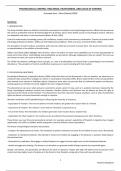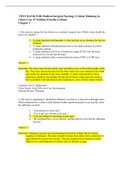Samenvatting
Summary of 'Psychological Control. Reactance, Helplessness, and Locus of Control' by Sosa and Zubieta
- Vak
- Instelling
Summary, explanation and conclusion of the main ideas of the text 'Psychological Control. Reactance, Helplessness, and Locus of Control' by Sosa and Zubieta.
[Meer zien]





